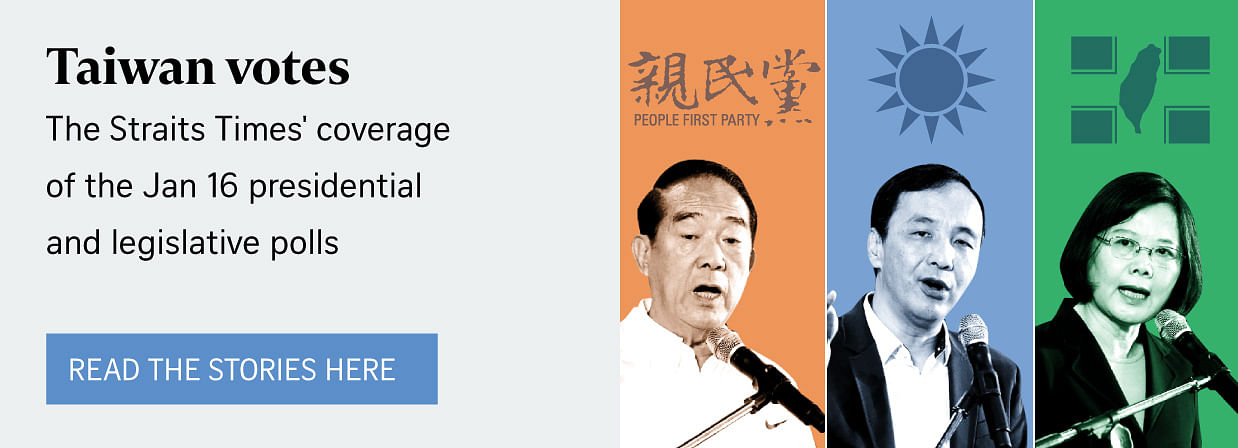TAIPEI (AFP) - Taiwan's voters, angry at low salaries and unaffordable housing, are set to elect a new president - but the island's flagging fortunes and a slowdown in China mean the winner will have a mountain to climb.
Tsai Ing-wen of the main opposition Beijing-sceptic Democratic Progressive Party (DPP) is expected to win the presidential vote, polling well ahead of rival candidate Eric Chu from the embattled ruling Kuomintang (KMT).
Chu is struggling to win public support as the KMT's popularity has plummeted over its China-friendly policies and failure to deliver the prosperity promised by current President Ma Ying-jeou.
More than 20 deals with China have been signed since Ma took office in 2008 and Taiwan's tourist industry has flourished under an eight-year rapprochement with Beijing as mainland visitors flock to the island.
But many voters feel warmer ties have benefited big business over ordinary people.
"Most people around me are living harder lives," said Kelly Chang, a 23-year-old former administrative assistant in Taipei who lost her job three months ago at a land development company that went bankrupt.
"I think the new DPP government can do better. I hope it can improve the economy and raise salaries. Cross-strait ties are important, but the benefits from better ties should be shared by all." Student-led protesters occupied parliament in 2014 to oppose a China trade pact, forcing the government to shelve the deal.
But it is not just the younger generation voicing frustration.
"Enough is enough," said one 60-year-old mechanic at a car repair shop in Taipei, who declined to give his name.
"Everyone who comes to our shop complains, saying they are suffering from the bad economy. Our business is falling too," he added. "I think those who want a better future for Taiwan will want to change the ruling party."
Analysts say Ma was dealt a tough hand, with the 2008 financial crisis, European debt problems and a China slowdown - all of which have been bad news for Taiwan's export-driven economy.
The island's key technology sector has suffered from weak demand, particularly as China seeks to create its own homegrown tech industry.
There are rocketing housing prices, an ageing population and low birth-rate to deal with.
But the KMT's approach has also drawn criticism.
"For the past four years, Taiwan's GDP growth averaged around 2.3 per cent annually, but people's average income rose merely one per cent," said Gordon Sun, head of the Macroeconomic Forecasting Centre at the Taiwan Institute of Economic Research.
"The fruits of economic growth were not shared by the general public." Taiwan has trimmed its growth forecast for 2016 to 2.32 per cent, from an earlier 2.7 per cent.
One factor is a restrictive approach to outside investment, according to Sun.
"(The government) should give top priority to the lifting of restrictions on investments by foreign and mainland companies, which have deterred the development of innovation," he said.
The DPP has promised to diversify an economy it says is too dependent on China.
But KMT candidate Chu emphasises Taiwanese businesses can continue to benefit from their relations with China, despite an economic slowdown on the mainland.
Both parties are also seeking to address the domestic issues riling voters, from pension schemes to income tax.
Yet while the dominant public sentiment is that Taiwan needs a change to prosper, there are jitters in the business community that relations with China will deteriorate under the DPP.
The traditionally pro-independence party has no official channel of communication with Beijing.
Taiwan split from the mainland in 1949 after a civil war, but China still considers it part of its territory awaiting reunification.
The tourism sector is particularly nervous - China has reportedly restricted visits to Taiwan during past political turbulence.
"Some local travel agents focused on Chinese tourists coming to Taiwan have prepared for the worst," said Ringo Lee, spokesman for the Travel Agent Association of Taiwan.
"Mainland authorities have been known to use their out-bound tourists as bargaining chips in practising diplomacy," said Lee.
Analyst Sun warns voters that overnight change is "unrealistic".
"Whoever is elected, it will be no easy task," he said.


